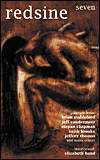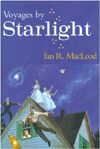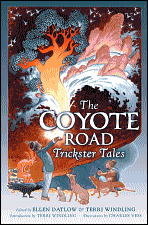
Ideomancer Unbound, edited by Chris Clarke, Mikal Trimm
Book Review by Amy Sterling Casil
Have you read this book?
Ideomancer Unbound is a big, ambitious anthology produced by managing editors Chris Clarke and Mikal Trimm, and contributing editors Catherine Freeze, Amber van Dyk, Pam McNew, Jennifer De Guzman, Chelsea Polk and Dorian Grey. Multi-talented Cat Sparks created the cover, and contributed a story as well.
It is difficult to categorize Ideomancer Unbound because of the great variety of stories and voices it contains. Dedicated SF, fantasy and horror readers will all find something to enjoy in its pages, and those who enjoy stories combining all of these elements will also be pleased. Twenty-six stories by twenty-six authors add up to a substantial amount of short fantastic fiction.
Ideomancer Unbound includes stories by favorite authors like Mike Resnick and Jack Dann, and by writers who are rapidly gaining critical attention, like Jeff Vandermeer. Other authors whose names will be familiar include Stephen Dedman, Charles Coleman Finlay, and Tobias Buckell. Much of the rest of the volume is written by relative newcomers, with a few stories - very difficult to tell from the author biographies that conclude the volume - looking like first story publications from some of the authors.
I don't do "reviews" as a rule, but Daniel Blackston asked if I'd read Ideomancer Unbound, and Daniel has been so supportive and is such an enthusiastic writer and reviewer that I agreed.
About the stories themselves, here is what they are, in table-of-contents order:
"Readers Anonymous" by Mark Siegel is a brief account of a "reformed reader." Told in AA-confessional style, the narrator Mark talks about a future in which reading is considered to be a failing worse than alcoholism or drug addiction today. Siegel's story shows witty flashes, like the Pay Per View Riots and the Son of Spock slayings. Even though I don't "buy" the story's proposed future, nor the premise that secret, addicted readers would have to be made "fiction free" by Public Blinding, presumably), it's a short, witty and enjoyable tale.
Patrick Samphire's "Love Stories From the Jungle" is a serious fantasy story about Amazonian jungle people told in several points of view. The magical quality of the characters, especially Valara, "the greatest hunter in the jungle," easily draws readers in. The fantastic, exotic natural life of the group of Amazonian natives is coming to an end; their lives and hopes are woven thoughtfully together with the real-world destruction of the rainforest and encroachment of modern society with its non-magical, but deadly bulldozers and weapons. There are many beautiful and wonderful inventions in this story, told with a sensitivity that fantasy readers will enjoy.
"The Razor Salesman" by Deborah Biancotti is a horror-tinged, very British-feeling SF/fantasy story. Strange, repressed mother Ellen struggles to feed her sons while resenting the neighbor boy, Andy, who's always wanting to stay for dinner. Biancotti misdirects the reader during the course of the story; the razor salesman's wares don't turn out to have the purpose that the reader originally believes. "The Razor Salesman's" world is an odd, disturbing one that exists outside of any "real" time, with elements of past, present and future combined, creepy, weird and "grey" in the tradition of a great number of British stories of loss of identity and social malaise.
Dave Felts tells the story of an eponymous antihero in "This is Jimmy Dale." Jimmy thinks he lucks out when he meets Yaoming, a human Host who's been taken over by a vampiric alien "Energizer." Felts twists the familiar chosen-by-aliens theme by making Jimmy as unspecial as they come; as Jimmy says, his "luck is so bad he couldn't get hit by a train if he stood on the tracks."
Space Pirate Captain Thankless is the kind of guy, and his story the kind of story that gives non-Sci Fi cognoscenti hives. Adam Browne shows a mad gift for bizarre sci-fi language and invention in "Captain Thankless." Readers of Jack Vance and lovers of language will enjoy this far-future, spacefaring "Flying Dutchman" of a tale. Death-splendid first mate "Wragge danced for balance on his mathematical leg and the pterodactyl shrieked as the decks canted . . ." There's a little bit of Cordwainer Smith going on, too. Don't read this one for plot or character, or if green teeth bother you.
The anonymous narrator in Marlin Seigman's "Dust Came Down" is slumming in a messed-up future Mexico. He's "The Gringo" without an American lover, yet another in a long line of losers come too late, with a little bit of money and a jones for weird girls. His Mexican love has wings, and according to the story, Mexican pharmaceuticals have gotten even better between now and then. This is a well-written story, but readers may feel more sympathetic to the winged prostitute than to the narrator, or his vastly-old, dissolute, memory-filled buddy Jerry.
Teens Chris, Icky, Yu and Devon decide to quit playing video games and have a real adventure in Samuel Minier's "Game of Friends." Minier tells a good, taut horror tale squarely in the Arkham tradition, notable for its characterization, sharp writing, and suspense.
Earth is destroyed and Princess Yasmina and Prince Hamid are the last of their royal line, raised by Mama, a "motherbrain" computer on a crippled starliner. Cat Sparks creates an absorbing future in "Pod." This story is even more reminiscent of Cordwainer Smith's future histories than "Captain Thankless," and inveterate sci-fi readers will find themselves drawn into Yasmina's sad, strange fate through Sparks' excellent writing and the unveiling of mysteries in an economical, effective style.
Dave's bored out of skull driving with his Dad to lame attractions over summer vacation in Greg Beatty's "Mermaid World." The magic is real, although Dave doesn't ever seem to find out why mermaids like orange soda. This is a brief, effective fantasy story.
Another family is driving down the road, and soon enough, John and Edie and their three children hit something in Charles Coleman Finlay's "Roadkill." This critter isn't dead, though, and the family ends up volunteering to take care of a rare, ultra-endangered "hedgecock" or holbytla. As any good Tolkien reader knows, this critter's name is going to be a simple, two-syllable affair, something like, oh, Dilbo. It's just a Peter Pan kind of thing, with the Gollum-like Dilbo playing the wild boy.
Daniel E. Blackston tells a creepy, atmospheric tale of Obersturmfuhrer Schact and his German troops' encounter with the archetypal Russian witch, Baba Yaga in "Osarovo Snow." As encounter-filled as an old "Combat" TV show, Blackston successfully combines a realistic Eastern Front frigid wasteland with fantasy and terror.
"Instructions for Pandora's Box" by Robert Hood is the type of story one used to see in the 70's in SF magazines and anthologies, but which is too seldom seen these days. The eminently dislikeable Mr. Felix Barker, EUS Director of External Policy for the State Ministry, receives a package that only he can see. It comes with instructions for opening of an ominous nature; the unhappy, power-mongering Barker attempts to assure himself of its reality or potential throughout the elegantly-written tale. It's a good, solid SF story with a nice retro feel.
Christopher Rowe tells the story of Appalach, an American dragon, in "The Dreaming Mountains." Lovely language and a folk-tale's economy mark this brief, beautiful American fable.
Ideomancer Unbound is a fine anthology, but Jack Dann's "Blind Eye," stands out as no less fine a story than his much-praised "The Diamond Pit." Far shorter than "The Diamond Pit, "Blind Eye" tells the story of Faustian Carlos Smlta, who is trapped in a purgatorial sensory time-web of regret and memory with many versions of his dead wife Helen. In a story of time, sense and memory, Dann's rich prose and literary excellence shine. Most of the stories are original to this anthology, but this story originally appeared in Australia's Eidolon. Perhaps it will now reach a new audience.
In fun and mystery, the tiger lady rides into town in Meredith L. Patterson's "Tiger, Tiger." The town's children are fascinated by the tiger lady and her mount; magic is done, and the story reaches a lovely, if bittersweet conclusion.
Burnt-out case Elijah Fall confronts the cyber-cosmos in Claire McKenna's "Olive Reason." Full of religious metaphor and with some imaginative scenes, it's possible that the metaphors are a little mixed - there are too many drugs, too many permutations, too many names - and an uncertain, yet likely bad end for Elijah, a decidedly un-prophetlike hero.
Lone stranger Naden visits a planet where the people use nanotechnology to be reborn as animals in Justin Stanchfield's "Trail's End." Naden is forced to make tough choices, but it's a little difficult to follow the complex culture and society of the planet and its people; for example, Naden carries a carbine, but other aspects of technology are far advanced, while the society holds shamanistic magical beliefs. However, Stanchfield writes an interesting combination of SF, some fantasy elements, and a "Man With No Name" protagonist.
Jeff Vandermeer is a marvelous writer, and "Siesta del Muerte" is a kaleidoscopically-told story of mercenary-like paratrooper David McDiarmid and his mission of destiny in Latin American Bananama City. Fans of Roland the Headless Thompson Gunner will recognize McDiarmid's type, although McDiarmid does have a son and wife, and deep and abiding ties to his zombie pal Chuck. Younger readers unfamiliar with Tim O'Brien or Robert Stone will thrill to this story's psychedelic scenes of war and horror, alternate Zapatas, Latin radio lamias and orgiastic ejaculations of capitalistic ordnance. A reprint, the story originally appeared in Dark Voices 5.
Thoughtful Australian writer Stephen Dedman writes an alternate-history twist on the Ted Bundy "legend" in "Probable Cause." A quiet story about where chance and a sociopathic charm might have taken a monster, it succeeds as social criticism in its simplicity perhaps more than the fireworks-filled Zapata-to-Sex-to-Santa story that it follows. This story originally appeared in Orb Science Fiction.
"Tides" tells the story of young Siana's life and that of her sister Miasia in Tobias Buckell's rich fantasy story. Fantasy readers will enjoy the unique world of the Roranraka sea and Siana's tall-village, both familiar and strange. They will also enjoy the well-told story full of believable feelings and conflict, and well-drawn characters.
Patricia Russo writes a wonderful, old-fashioned, yet satisfying wicked doppelganger story in "Notion." The pleasure of such stories is in their insights into human nature - if they are good - and this one captures something "special" in the sort of human behavior shown by people like the Tylenol poisoner or the Anthrax terrorist.
John Dixon's "Punnet Square Pundit" delivers on its promise to be full of puns, illogical but delightful surprises, a "woman of the house," a traveling salesman, and of course - a giant space squid. It has a "classic" feel (I mean that in the good sense) and is, like several other stories in Ideomancer Unbound of the just-plain entertaining, traditional SF sort that aren't seen much these days.
"Through the Window," by Iain Rowan starts promisingly with paranoid, wimpish, yet likeable Parker noticing a odd broken window in a house on his usual route to work. This, of course, is no ordinary house or broken window. There's a wonderful quality of desperation to Parker's narrative, but the story's effect is muted because Parker is not the only passer-by to notice the window, or to go inside.
Boozehound disability investigator Daryl Dachs is the protagonist of James Allison's "GirlCam9." Allison works like a stevedore to make Dachs loathsome, and he's hard to redeem in the end. Bad drugs, prim pornos, and a well-worn future negaverse are Dachs' territory. Allison's rummy near-future Marlowe chases down an easy-to-catch baddie while battling guilt over his dead daughter.
Few things are more satisfying than reading a smooth story by a writer with Mike Resnick's confidence and style. Even though the title, "Slice of Life," and the Vietnam massacre background lead the reader to expect a tale of shock and revenge, Resnick's creative twists keep the story suspenseful and "Ellery Curtis's" fate in question to the very end. This tightly-woven cracker was first featured in the last issue of Twilight Zone, and it's too bad that magazine's gone.
Fate puts Second World War Lieutenant Tadashi Orita in charge of selecting a flight of kamakaze pilots in "On to Yasakuni," by Barbara Davies. Spare and lovely, like a Japanese garden, this story tells of bushido in a thoughtful way, and in its brief space, draws a memorable character in Tadashi, and a fascinating memorial to the mysterious and disturbing kamikaze themselves.
After twenty-six stories, it's hard to put a final spin on Ideomancer Unbound. It's a hefty volume of fine reading, and dedicated readers will find many and varied pleasures in it. Particularly welcome to this reader were the well-crafted and taut horror stories, like Patricia Russo's "Notion," and the unusual, evocative fantasy stories, such as Tobias Buckell's "Tides" and Patrick Samphire's wistful "Love Stories From the Jungle." There's a tremendous amount of good writing in Ideomancer Unbound. There's no shortage of sci-fi in this anthology - readers will enjoy the many and varied future visions. Maybe Ideomancer Unbound is like a great big quilt, with a different, complex picture on each square. The editors should be praised for assembling such an impressive collection of work, and readers will get their money's worth in plenty of surprise and delight.
It is difficult to categorize Ideomancer Unbound because of the great variety of stories and voices it contains. Dedicated SF, fantasy and horror readers will all find something to enjoy in its pages, and those who enjoy stories combining all of these elements will also be pleased. Twenty-six stories by twenty-six authors add up to a substantial amount of short fantastic fiction.
Ideomancer Unbound includes stories by favorite authors like Mike Resnick and Jack Dann, and by writers who are rapidly gaining critical attention, like Jeff Vandermeer. Other authors whose names will be familiar include Stephen Dedman, Charles Coleman Finlay, and Tobias Buckell. Much of the rest of the volume is written by relative newcomers, with a few stories - very difficult to tell from the author biographies that conclude the volume - looking like first story publications from some of the authors.
I don't do "reviews" as a rule, but Daniel Blackston asked if I'd read Ideomancer Unbound, and Daniel has been so supportive and is such an enthusiastic writer and reviewer that I agreed.
About the stories themselves, here is what they are, in table-of-contents order:
"Readers Anonymous" by Mark Siegel is a brief account of a "reformed reader." Told in AA-confessional style, the narrator Mark talks about a future in which reading is considered to be a failing worse than alcoholism or drug addiction today. Siegel's story shows witty flashes, like the Pay Per View Riots and the Son of Spock slayings. Even though I don't "buy" the story's proposed future, nor the premise that secret, addicted readers would have to be made "fiction free" by Public Blinding, presumably), it's a short, witty and enjoyable tale.
Patrick Samphire's "Love Stories From the Jungle" is a serious fantasy story about Amazonian jungle people told in several points of view. The magical quality of the characters, especially Valara, "the greatest hunter in the jungle," easily draws readers in. The fantastic, exotic natural life of the group of Amazonian natives is coming to an end; their lives and hopes are woven thoughtfully together with the real-world destruction of the rainforest and encroachment of modern society with its non-magical, but deadly bulldozers and weapons. There are many beautiful and wonderful inventions in this story, told with a sensitivity that fantasy readers will enjoy.
"The Razor Salesman" by Deborah Biancotti is a horror-tinged, very British-feeling SF/fantasy story. Strange, repressed mother Ellen struggles to feed her sons while resenting the neighbor boy, Andy, who's always wanting to stay for dinner. Biancotti misdirects the reader during the course of the story; the razor salesman's wares don't turn out to have the purpose that the reader originally believes. "The Razor Salesman's" world is an odd, disturbing one that exists outside of any "real" time, with elements of past, present and future combined, creepy, weird and "grey" in the tradition of a great number of British stories of loss of identity and social malaise.
Dave Felts tells the story of an eponymous antihero in "This is Jimmy Dale." Jimmy thinks he lucks out when he meets Yaoming, a human Host who's been taken over by a vampiric alien "Energizer." Felts twists the familiar chosen-by-aliens theme by making Jimmy as unspecial as they come; as Jimmy says, his "luck is so bad he couldn't get hit by a train if he stood on the tracks."
Space Pirate Captain Thankless is the kind of guy, and his story the kind of story that gives non-Sci Fi cognoscenti hives. Adam Browne shows a mad gift for bizarre sci-fi language and invention in "Captain Thankless." Readers of Jack Vance and lovers of language will enjoy this far-future, spacefaring "Flying Dutchman" of a tale. Death-splendid first mate "Wragge danced for balance on his mathematical leg and the pterodactyl shrieked as the decks canted . . ." There's a little bit of Cordwainer Smith going on, too. Don't read this one for plot or character, or if green teeth bother you.
The anonymous narrator in Marlin Seigman's "Dust Came Down" is slumming in a messed-up future Mexico. He's "The Gringo" without an American lover, yet another in a long line of losers come too late, with a little bit of money and a jones for weird girls. His Mexican love has wings, and according to the story, Mexican pharmaceuticals have gotten even better between now and then. This is a well-written story, but readers may feel more sympathetic to the winged prostitute than to the narrator, or his vastly-old, dissolute, memory-filled buddy Jerry.
Teens Chris, Icky, Yu and Devon decide to quit playing video games and have a real adventure in Samuel Minier's "Game of Friends." Minier tells a good, taut horror tale squarely in the Arkham tradition, notable for its characterization, sharp writing, and suspense.
Earth is destroyed and Princess Yasmina and Prince Hamid are the last of their royal line, raised by Mama, a "motherbrain" computer on a crippled starliner. Cat Sparks creates an absorbing future in "Pod." This story is even more reminiscent of Cordwainer Smith's future histories than "Captain Thankless," and inveterate sci-fi readers will find themselves drawn into Yasmina's sad, strange fate through Sparks' excellent writing and the unveiling of mysteries in an economical, effective style.
Dave's bored out of skull driving with his Dad to lame attractions over summer vacation in Greg Beatty's "Mermaid World." The magic is real, although Dave doesn't ever seem to find out why mermaids like orange soda. This is a brief, effective fantasy story.
Another family is driving down the road, and soon enough, John and Edie and their three children hit something in Charles Coleman Finlay's "Roadkill." This critter isn't dead, though, and the family ends up volunteering to take care of a rare, ultra-endangered "hedgecock" or holbytla. As any good Tolkien reader knows, this critter's name is going to be a simple, two-syllable affair, something like, oh, Dilbo. It's just a Peter Pan kind of thing, with the Gollum-like Dilbo playing the wild boy.
Daniel E. Blackston tells a creepy, atmospheric tale of Obersturmfuhrer Schact and his German troops' encounter with the archetypal Russian witch, Baba Yaga in "Osarovo Snow." As encounter-filled as an old "Combat" TV show, Blackston successfully combines a realistic Eastern Front frigid wasteland with fantasy and terror.
"Instructions for Pandora's Box" by Robert Hood is the type of story one used to see in the 70's in SF magazines and anthologies, but which is too seldom seen these days. The eminently dislikeable Mr. Felix Barker, EUS Director of External Policy for the State Ministry, receives a package that only he can see. It comes with instructions for opening of an ominous nature; the unhappy, power-mongering Barker attempts to assure himself of its reality or potential throughout the elegantly-written tale. It's a good, solid SF story with a nice retro feel.
Christopher Rowe tells the story of Appalach, an American dragon, in "The Dreaming Mountains." Lovely language and a folk-tale's economy mark this brief, beautiful American fable.
Ideomancer Unbound is a fine anthology, but Jack Dann's "Blind Eye," stands out as no less fine a story than his much-praised "The Diamond Pit." Far shorter than "The Diamond Pit, "Blind Eye" tells the story of Faustian Carlos Smlta, who is trapped in a purgatorial sensory time-web of regret and memory with many versions of his dead wife Helen. In a story of time, sense and memory, Dann's rich prose and literary excellence shine. Most of the stories are original to this anthology, but this story originally appeared in Australia's Eidolon. Perhaps it will now reach a new audience.
In fun and mystery, the tiger lady rides into town in Meredith L. Patterson's "Tiger, Tiger." The town's children are fascinated by the tiger lady and her mount; magic is done, and the story reaches a lovely, if bittersweet conclusion.
Burnt-out case Elijah Fall confronts the cyber-cosmos in Claire McKenna's "Olive Reason." Full of religious metaphor and with some imaginative scenes, it's possible that the metaphors are a little mixed - there are too many drugs, too many permutations, too many names - and an uncertain, yet likely bad end for Elijah, a decidedly un-prophetlike hero.
Lone stranger Naden visits a planet where the people use nanotechnology to be reborn as animals in Justin Stanchfield's "Trail's End." Naden is forced to make tough choices, but it's a little difficult to follow the complex culture and society of the planet and its people; for example, Naden carries a carbine, but other aspects of technology are far advanced, while the society holds shamanistic magical beliefs. However, Stanchfield writes an interesting combination of SF, some fantasy elements, and a "Man With No Name" protagonist.
Jeff Vandermeer is a marvelous writer, and "Siesta del Muerte" is a kaleidoscopically-told story of mercenary-like paratrooper David McDiarmid and his mission of destiny in Latin American Bananama City. Fans of Roland the Headless Thompson Gunner will recognize McDiarmid's type, although McDiarmid does have a son and wife, and deep and abiding ties to his zombie pal Chuck. Younger readers unfamiliar with Tim O'Brien or Robert Stone will thrill to this story's psychedelic scenes of war and horror, alternate Zapatas, Latin radio lamias and orgiastic ejaculations of capitalistic ordnance. A reprint, the story originally appeared in Dark Voices 5.
Thoughtful Australian writer Stephen Dedman writes an alternate-history twist on the Ted Bundy "legend" in "Probable Cause." A quiet story about where chance and a sociopathic charm might have taken a monster, it succeeds as social criticism in its simplicity perhaps more than the fireworks-filled Zapata-to-Sex-to-Santa story that it follows. This story originally appeared in Orb Science Fiction.
"Tides" tells the story of young Siana's life and that of her sister Miasia in Tobias Buckell's rich fantasy story. Fantasy readers will enjoy the unique world of the Roranraka sea and Siana's tall-village, both familiar and strange. They will also enjoy the well-told story full of believable feelings and conflict, and well-drawn characters.
Patricia Russo writes a wonderful, old-fashioned, yet satisfying wicked doppelganger story in "Notion." The pleasure of such stories is in their insights into human nature - if they are good - and this one captures something "special" in the sort of human behavior shown by people like the Tylenol poisoner or the Anthrax terrorist.
John Dixon's "Punnet Square Pundit" delivers on its promise to be full of puns, illogical but delightful surprises, a "woman of the house," a traveling salesman, and of course - a giant space squid. It has a "classic" feel (I mean that in the good sense) and is, like several other stories in Ideomancer Unbound of the just-plain entertaining, traditional SF sort that aren't seen much these days.
"Through the Window," by Iain Rowan starts promisingly with paranoid, wimpish, yet likeable Parker noticing a odd broken window in a house on his usual route to work. This, of course, is no ordinary house or broken window. There's a wonderful quality of desperation to Parker's narrative, but the story's effect is muted because Parker is not the only passer-by to notice the window, or to go inside.
Boozehound disability investigator Daryl Dachs is the protagonist of James Allison's "GirlCam9." Allison works like a stevedore to make Dachs loathsome, and he's hard to redeem in the end. Bad drugs, prim pornos, and a well-worn future negaverse are Dachs' territory. Allison's rummy near-future Marlowe chases down an easy-to-catch baddie while battling guilt over his dead daughter.
Few things are more satisfying than reading a smooth story by a writer with Mike Resnick's confidence and style. Even though the title, "Slice of Life," and the Vietnam massacre background lead the reader to expect a tale of shock and revenge, Resnick's creative twists keep the story suspenseful and "Ellery Curtis's" fate in question to the very end. This tightly-woven cracker was first featured in the last issue of Twilight Zone, and it's too bad that magazine's gone.
Fate puts Second World War Lieutenant Tadashi Orita in charge of selecting a flight of kamakaze pilots in "On to Yasakuni," by Barbara Davies. Spare and lovely, like a Japanese garden, this story tells of bushido in a thoughtful way, and in its brief space, draws a memorable character in Tadashi, and a fascinating memorial to the mysterious and disturbing kamikaze themselves.
After twenty-six stories, it's hard to put a final spin on Ideomancer Unbound. It's a hefty volume of fine reading, and dedicated readers will find many and varied pleasures in it. Particularly welcome to this reader were the well-crafted and taut horror stories, like Patricia Russo's "Notion," and the unusual, evocative fantasy stories, such as Tobias Buckell's "Tides" and Patrick Samphire's wistful "Love Stories From the Jungle." There's a tremendous amount of good writing in Ideomancer Unbound. There's no shortage of sci-fi in this anthology - readers will enjoy the many and varied future visions. Maybe Ideomancer Unbound is like a great big quilt, with a different, complex picture on each square. The editors should be praised for assembling such an impressive collection of work, and readers will get their money's worth in plenty of surprise and delight.
| Ideomancer Unbound, edited by Chris Clarke, Mikal Trimm on Amazon |
Ideomancer Unbound, edited by Chris Clarke, Mikal Trimm on Amazon

Comment on Ideomancer Unbound, edited by Chris Clarke, Mikal Trimm
| Comments on Ideomancer Unbound, edited by Chris Clarke, Mikal Trimm |
| There are no comments on this book. |




